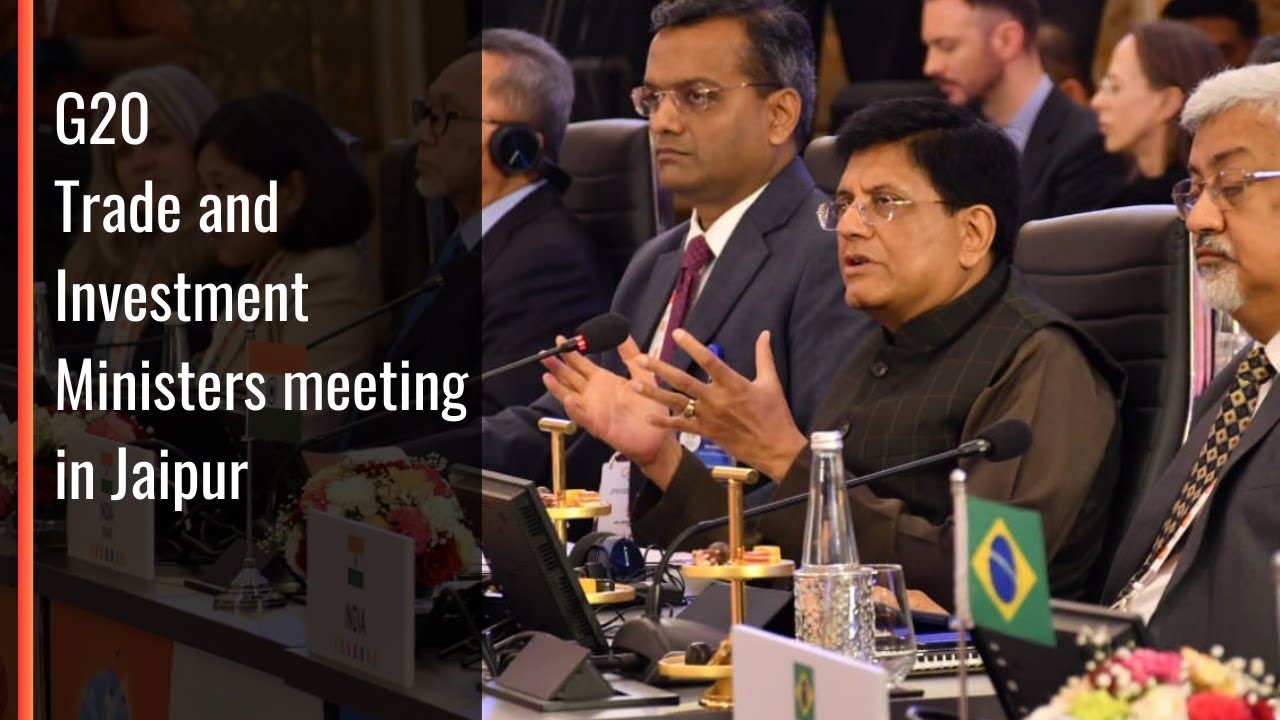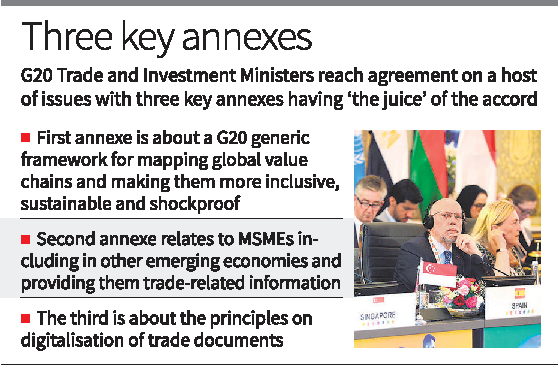Description

Disclaimer: Copyright infringement not intended.
Context
- Trade and Investment Ministers of G20 nations, agreed to map global value chains, integrate small businesses with them and ease trade documentation.
- However, the two-day meeting concluded without a joint statement due to differences over references to the Russia-Ukraine conflict. The recommendations from the meeting will be forwarded to the G20 leaders who will meet in September.
Details

First Annexe
- The first annex are talks of a G20 generic framework for mapping global value chain towards understanding where the problems are and what needs to be done to make our value chains more inclusive, sustainable, and shock-proof.
Second Annexe
- The second annexe addresses micro, small and medium enterprises (MSMEs).
- MSMEs have a limited ability, given their small size, to have full access to information, finance and market-sensitive data points so whilst they can contribute much more to economies, they remain constrained in their ability to do so. The call for action recognises this challenge and involves upgrading existing databases and portals to provide trade-related information.
- A global trade help desk, operated by the International Trade Centre, will be continuously upgraded in consultation with UNCTAD and the World Trade Organisation (WTO), so that it becomes more inclusive and provides very rich data to MSMEs.
Third Annexe
- The third annexe relates to high-level principles on digitalization of trade documents so that paper documents and impediments to seamless flow of goods and services will be curbed.
- This, would reduce the time-consuming, labour-intensive and error prone way of working and facilitate international trade.

India’s G20 Presidency
- It was December 1st, 2022 when Prime Minister Modi held the gavel of the G20 presidency for one year from his Indonesian counterpart in Bali. It will continue to hold it till 30 November 2023.
- The G20 is particularly important for a celebratory country like India, known in Sanskrit as “Utsavdharmita”, which loves to celebrate and showcase its cultural diversity on the global stage.
- G20 meetings are being held across the country as India uses the forum to promote the theme of “Vasudhaiva Kutumbakam” or “One Earth, One Family, One Future”.
What are India’s G20 priorities?
- India wants its presidency to be “inclusive, ambitious, decisive, and action-oriented”. With that aim, it has decided to focus on six priorities.
Green Development, Climate Finance and LiFE:
- Climate finance and technology, along with “ensuring just energy transitions for developing nations across the world”, are key priority areas for India during its presidency.
- With LiFe, a “behaviour-based movement that takes from the country’s rich, ancient sustainable traditions, India plans to “nudge consumers, and in-turn markets, to adopt environmentally-conscious practices”.
Accelerated, resilient and inclusive growth:
- India is concentrating on areas that can usher in structural transformation, such as promoting labour rights and secure labour welfare, addressing the global skills gap and so on.
Accelerating progress on Sustainable Development Goals (SDGs):
- India has already had success in getting the G20 members, which includes 19 countries and the European Union, on board with this goal. Following the G20 development ministers’ meeting in Varanasi earlier this week, foreign minister S Jaishankar said India bagged its “biggest achievement” as the group unanimously agreed to an action plan to speed up progress on SDGs and on sustainable development lifestyles, reported Times of India (TOI).
Technological Transformation and Digital Public Infrastructure:
- According to MEA, India will endorse a “human-centric approach to technology, and facilitate greater knowledge-sharing in priority areas like digital public infrastructure, financial inclusion, and tech-enabled development in sectors ranging from agriculture to education”.
Multilateral Institutions for the 21st Century:
- India will push for a “more accountable, inclusive just, equitable and representative multipolar international system” that is capable of addressing the concerns of this century.
Women-led development:
- Not just women empowerment and representation, India will emphasise bringing women to leading positions to bolster socio-economic development.
Why is India’s presidency significant?
- G20 presidency matters for India for various reasons.
Agenda-Setting
- First, agenda-setting is a fundamental and primary tool for securing and extending power and influence in international politics, particularly in multilateral platforms. The year-long G20 presidency offers India a significant opportunity to set global agendas, articulate policies and build consensus over critical economic, development, socio-political and security issues.
Voice of the Global South
- Second, in global platforms, India always wanted to promote and endeavour to be the voice of the Global South. India can utilise its G20 leadership role to advance the interests of the Global South and New Delhi's own credentials as a voice of the Global South.
Reform of multilateral institutions
- Third, reforming multilateral institutions to make them more inclusive and responsible is one of the foremost priorities of Indian foreign policy.
- Confronted with issues like climate change, economic recovery, pandemic and increasing geopolitical tensions, the global community is looking for effective and accountable multilateral institutions that could deliver better in the field.
- Therefore, India placed reformed multilateralism that is fit for addressing the 21st-century challenges as one of its presidential priorities. If G20, under India's leadership, facilitates progress on this long-pending issue, it will increase India's stature and status in global politics.
Building a Global Consensus
- Finally, India's presidency comes at a time of escalating global tensions coinciding with a period of flux globally.
- The world faces multiple challenges, including post COVID-19 economic recovery, climate change, food and energy security crisis, supply chain disruptions and conflicts.
- The international community expect India to be instrumental in building a global consensus for addressing these issues and shaping the future agenda of global common goods.
- Similarly, the world is also expecting India to bridge the increasing divide between countries, not only the developing and developed world split but the rupture among the West as well, especially in the context of the Russia–Ukraine War.

Achievements under India’s G20 Presidency
- Under India's presidency in 2023, the G20 significant progress has been made in debt restructuring through the Common Framework.
- In 2023, under India’s presidency, the G20 gave a significant boost to debt restructuring through the Common Framework. Before India’s lead, only Chad underwent debt restructuring under this framework. With India’s focus, Zambia, Ethiopia, and Ghana have made notable advancements. India played a pivotal role, being a key creditor.
- Beyond the Common Framework, G20 forums facilitated coordination for debt restructuring in Sri Lanka. A committee co-chaired by India, Japan, and France played a crucial role in this process.
- The Indian presidency also saw the inception of the Global Sovereign Debt Roundtable, co-chaired by the IMF, World Bank, and G20 presidency. The Roundtable aims to strengthen communication and foster a common understanding among key stakeholders, both within and outside the Common Framework, for facilitating effective debt treatments.
READ ABOUT G20:
https://www.iasgyan.in/ias-gazette-magazine/g-20-summit-key-takeaways
https://www.iasgyan.in/daily-current-affairs/g20-10
|
PRACTICE QUESTION
Q. India's G-20 presidency comes at a time of escalating global tensions coinciding with a period of flux globally. Why is India’s presidency significant? What have been the achievements under India’s G20 presidency till now?
|













